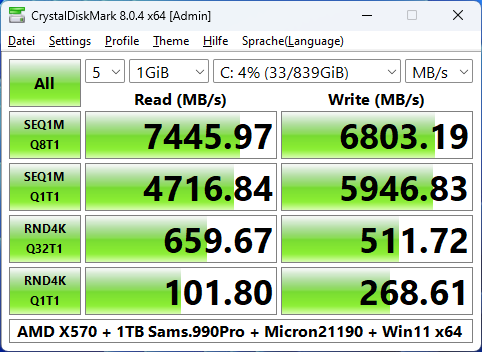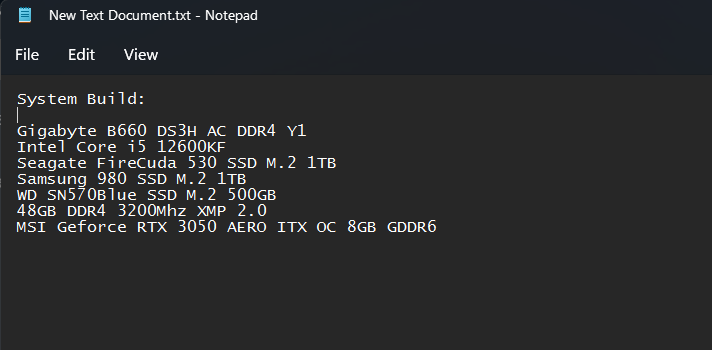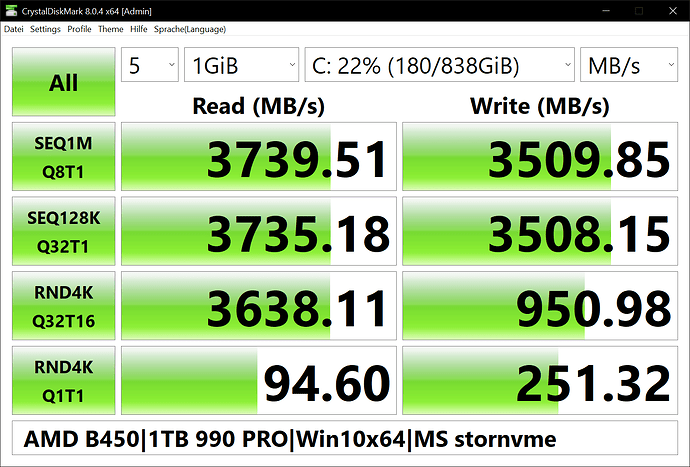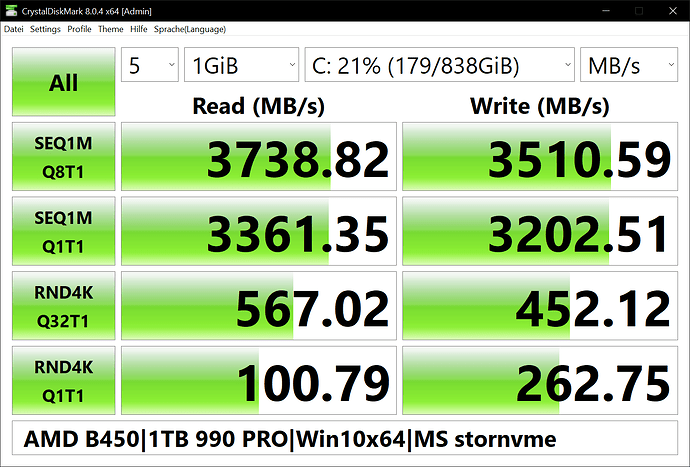As long as the PCIe 4.0 SSD is connected to a PCIe 3.0 slot, you cannot expect any noticeable performance gain.
By the way: Which other NVMe drivers did you test? This is the thread about recommended NVMe drivers. The performance depends on the in-use NVMe driver and may be different while testing different NVMe SSDs with different NVMe Controllers. Consequence: Different NVMe SSDs may need a different NVMe driver to get the best possible benchmark results.
Of course both SSDs are connected to the same PCIe slot and this is a PCIe 4.0 one (DELL Latitude 9420).
I have only tested the Microsoft driver for the WD. For the SKHynik (it has a manufacturer based controller) I have already tested Samsung, Phision and Micron and there a no noticeable differences. The WD has a Sandisk controller. So the Microsoft driver is a good choice. Maybe the Phision or the Micron are minimal better, but usually not worth talking about. In any case it would double the performance…
BTW: Should I move this topic to another thread?
Are you sure, that the slot really offers PCIe 4.0 while running a PCIe 4.0 capable NVMe SSD?
Example: My AMD X570 chipset ASRock mainboard supports PCIe 4.0, but only with a certain hardware configuration. As soon as I replace my discrete graphics card by a CPU integrated graphics adapter, the PCIe slots will only support PCIe 3.0.
You should check it by using a suitable hardware diagnostic tool.
I have done it for you.
150% sure.
Have you ever seen a PCIe 3.0 drive with seq. data rates of 5000/4000 MB/s?
But if you still do not trust me, check this:
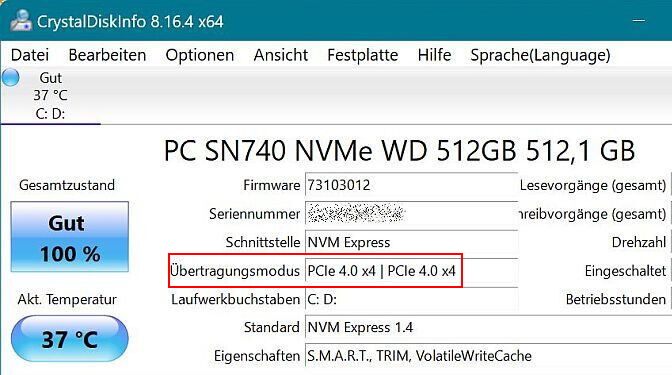
BIOS update / reset? Freshly installed Windows, or an upgrade of an existing one?
Maybe install Ubuntu for testing, then you can rule out the Windows “bug”. There is also a speed measurement option there. If you are interested, I can describe how you can do it.
BIOS was already up to date. Reset done.
Freshly installed Windows.
Sorry, but I am not interested in.
Sorry, but I cannot interpret the CrystalDiskMark images. They are a 1 TB partition test in the first picture, but the Anvil pictures are two 512 GB SSDs. Could you possibly do a CrystalDiskMark test with the SN740?
Both SSDs are 512GB.
Sorry, but I don’t see any 1 TB partition!? Both CDM-Tests are the same.
Greetings, as I do not know if it is appropriate for me to post here or start a new one relating to this topic subjectively.
Attached are two PNG’s CrystalMark Disk tests for Seagate FireCuda SSD M.2 and Samsung 980 SSD M.2 respectively. Samsung is the first one and Seagate is the second one.
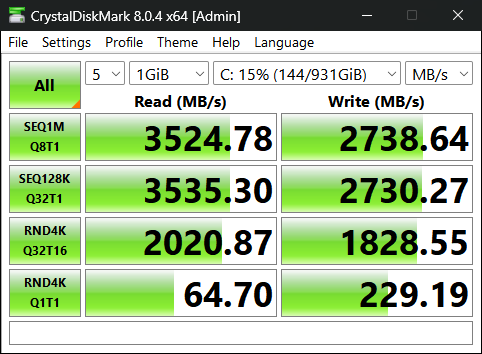
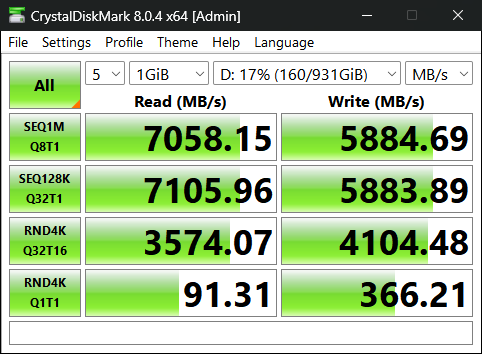
I am searching for the best known drivers for NVMe specifically.
I currently have three differenct NVMe Storage units as follows:
1 Seagate FireCuda 530 SSD M.2 1TB for the CPU
2 Samsung 980 SSD M.2 1TB (Not Pro) in the secondary slot
3 Western Digitial WD SN570 Blue 500GB in the third slot.
OS: Windows 11 Pro and Windows 11 Pro Insider Preview
Since having different manufacturers of NVMe is terrible to begin with, I had to resort to using, either Intel NVMe Controller driver or the Standard NVMe Controller Express of which for the Seagate FireCuda performs better.
I installed the Community NVMe for Samsung and it works well for Samsung and WD but not for FireCuda.
I was reading through this post here and found that another person here has the Micron NVMe Controller driver, which I looked for here and other places on the web but my search fell short of obtaining one. I don’t know what it’s called originally and where to obtain it. Searched Micron site but no luck.
The second choice was the Phison, had no luck obtaining.
One of the tests I noticed a great difference in was between Intel Chipset and AMD Chipset. Where the Same NVMe Samsung 980 Pro had better performance on the AMD chipset as far as the CrystalMark test. Convinced me that AMD X590 or X580 Chipset is way better in performance for NVMe drives.
I would greatly appreciate any assistance in obtaining very good drivers.
The Seagate (peak of 7300) is a PCIe4.0 NVMe and its connect to the CPU, so has way more speed than the PCIe3.0 Samsung and WD (Blue PCIe M.2 SATA/NVMe?!?..) connected to the PCH…i see no surprise here, the readings for the Samsung as PCIe 3.0 (3500/3000) are in the numbers.
I dont think you’ll get much more of the PCIe3.0 drives…
Do you know where to obtain Micron NVMe driver?
Didnt you searched in the forum for it?
EDIT: Browser security…blocked what? The forum doesnt block or harm anything…laziness
EDIT: Weren’t you looking for Micron drivers? Now you want to mix even more on your system…
Sorry…i must be really bad on my eyes…where is the JMicron NVMe on pointed link? I see some JMicron RAID…im not aware of any JMicron NVMe drivers for GEN4…
Apologies, I did but, I have all this browser security running and may have blocked it.
Edit 1:
Apologies about that, not interested in spreading someone’s snooping software, goes both ways.
Edit 2:
Thank you again. I was looking for this specifically and had lost it. Thank you MeatWar!
Edit 3:
MeatWar, question, what driver would you recommend?
Are the outdated JMicron NVMe drivers able to deliver for newer PCIe 4?
Edit by Fernando:
The 4 separate posts were merged by me (to save space and for better readability)
You’re right none for Gen 4 but works.
This the portion for it just below where the Raid ones are (>source<):
The Seagate FireCuda incorporates if I understand this correctly the Phison E18 Controller, Micron and and some other, it’s like a smorgasbord of on this stick.
Of which Seagate formatted somehow. There was quite a bit of jig jagging in the write up to which one is left a bit confused.
I would say to use for now the Standard NVMe Controller Express on Windows 11, as it should handle Gen 4 if Windows is updated. I haven’t found a Gen 4 driver of which I know of. I was hoping the JMicron v2.1.19.0 is, but not sure since there is no info saying it is.
I would like to find a Phison NVMe driver for the new E18 controller that is on the Seagate FIreCuda 530. I’m not sure why drivers for this M.2 are not up on the Seagate site or even Phison for that matter to go with the new controller. Kind of defeats the purpose.
Edit by Fernando: Quoted text marked as being quoted
@stumanchu
You obviously confused JMicron with Micron.
JMicron and Micron are completely different manufacturers of different Storage Controllers. Only Micron is offering NVMe Controllers and NVMe drivers.]
Here is my late answer (unfortunately I missed your question):
- In January 2022 I tested the Intel RST NVMe driver v17.11.0.1000 dated 09/30/2021, because it was the latest Intel RST driver at that time.
- The NVMe performance of the v19 platform Intel RST drivers cannot be tested, because none of them supports NVMe.
- Today I have done some new NVMe benchmark comparison tests with my X570 chipset PC running Win11 v22H2 and this time I have included the latest v17 and v18 platform Intel RST drivers v17.11.3.1007 and v18.37.4.1007. The results are below.
@all
As an update of the start post I have done today some new benchmark comparison tests with my AMD X570 PC by using a rather similar configuration.
Test system:
AMD X570 chipset PC (with Ryzen 5 5600X CPU + PCIe 4.0 support) running Win11 x64 Pro v22H2 Build 22621.900, freshly installed onto a 1 TB Samsung 980 Pro NVMe SSD.
These were the drivers I have tested now:
- Microsoft’s generic Win11 in-box NVMe driver v10.0.22621.755 named STORNVME.SYS dated 11/10/2022 (the shown date is wrong)
- Samsung’s NVMe driver v3.3.0.2003 WHQL dated 01/21/2020 (installation had to be forced)
- Phison’s generic NVMe driver v1.5.0.0 WHQL dated 02/23/2018
- Micron’s NVMe driver v2.1.18.0 WHQL dated 03/02/2021 (installation had to be forced)
- Intel’s RST NVMe driver v17.11.3.1007 WHQL dated 09/30/2022 (installation had to be forced, matching are the iaStorAC.inf file and the device “Intel(R) NVMe Controller”)
- Intel’s RST NVMe driver v18.37.4.1007 WHQL dated 06/08/2022 (installation had to be forced, matching are the iaStorAC.inf file and the device “Intel(R) NVMe Controller”)
Here are the benchmark results I got:
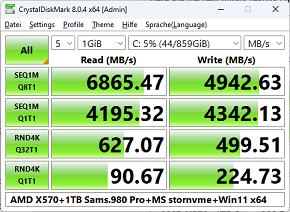
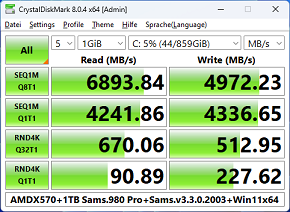
(left/upper Pic: generic MS in-box NVMe driver, right/lower Pic: Samsung’s specific NVMe driver v3.3.0.2003)
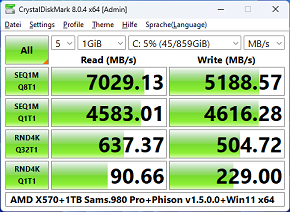
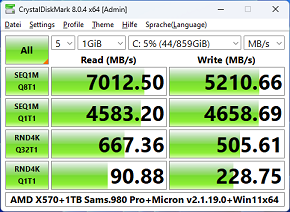
(left/upper Pic: generic Phison NVMe driver v1.5.0.0, right/lower Pic: Micron NVMe driver v2.1.19.0)
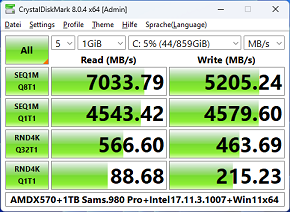
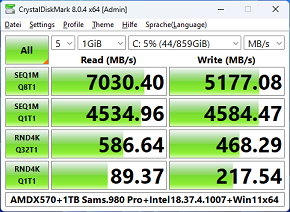
(left/upper Pic: Intel RST NVMe driver v17.11.3.1007, right/lower Pic: Intel RST NVMe driver v18.37.4.1007)
Evaluation of my test results:
- All 6 tested drivers could be installed and used without any problems. They gave my AMD X570 PC the expected very good benchmark numbers.
- The overall performance of all tested drivers seems to be rather similar, but there are noticeable differences between the upper 2 “Sequential” (SEC) and the lower 2 “Random” (RND) Read/Write results, if you compare them between the respectively in-use NVMe driver.
- Among my test candidates the MS and Samsung NVMe drivers gave my AMD system the worst Sequential Read/Write numbers, whereas the Intel ones were the worst regarding the Random Read/Write numbers.
- So the choice of the best performing NVMe driver depends on what the user needs/prefers for his/her PC work.
If there should be interest in similar tests with an Intel Z170 PC, please let me know it.
Nice! Thanks for all your efforts!! ![]()
Is there any driver compatible with the Samsung NVMe SSD 990 PRO 1TB?
@Dekal
All NVMe drivers, which are listed within the first post of this thread, are compatible with the NVMe Controller of the Samsung 990 Pro SSD, but the big majority of them can only be used after having forced the installation.
Here are the benchmark results I got with my AMD X570 chipset mainboard after having installed the Micron NVMe driver v2.1.19.0:
